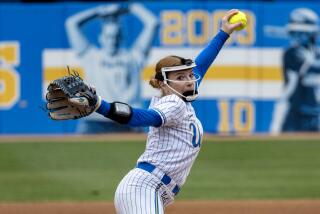As coach and player, Adam Wright gets to live two water polo dreams
- Share via
For as long as he can remember, Adam Wright wanted to become a water polo coach.
As a kid he’d watch the NCAA tournament — then held almost annually at Long Beach’s Belmont Plaza — and marvel at the influence a good coach could exert. As a standout at Long Beach Wilson High, a two-time NCAA champion at UCLA, mainstay of the U.S. national team and two Olympic squads, he studied his coaches, adapting their mannerisms and ideas to form his own philosophy.
He got a chance to put that into practice two years ago when UCLA offered him the chance to coach the men’s team, but he wasn’t ready to hang up his swim cap after a silver-medal finish in Beijing. Convinced that continuing to play would enhance his coaching abilities, Wright took on both roles — in addition to being a husband and father to a 2-year-old daughter with another child on the way.
“It’s not an ordinary thing to do but he’s not an ordinary guy,” said Adam Krikorian, who preceded Wright at UCLA and now coaches the U.S. women’s national team. “A coaching job in itself is not an ordinary life. But if anyone can do it, Adam can.”
Wright’s Bruins (20-4) are seeded third in the Mountain Pacific Sports Federation tournament, which opens Friday at UCLA’s Spieker Aquatics Center. The winner will advance to the NCAA tournament next weekend at UC Berkeley.
The Bruins won the MPSF tournament in 2009, Wright’s coaching debut, but lost to USC in the NCAA final. They missed the NCAA’s last season. This season they’ve lost only to the teams ranked ahead of them, USC and Cal, twice each.
“I do like the way the group has grown over the year. I do like the way they respond,” Wright said. “And I do like that they know going into any game that they can do it, that they have a chance if they’re doing the right things, the things they’re supposed to be doing. That’s a much better mind-set now than where we were, I think.”
Reaching this point has been a taxing experience for the 34-year-old Westside resident.
He stretched his days from 5:15 a.m. to 11:30 p.m. to accommodate training and coaching before he competed at the Pan Am Games last month in Guadalajara. He returned with a fractured left hand, suffered while he helped the U.S. finish first and clinch a berth at the London Olympics.
“It’s been a whirlwind,” he said, “but I feel fortunate to be in this position. Learning what some of the best coaches in the world are doing has been a tremendous help to me as a coach. Playing, too, being in the middle of the action at the highest level, gives me the chance to translate that here.”
He’s fortunate that the national team’s schedule has rarely conflicted with the Bruins’ schedule, but he’s spending a lot of time away from his family and on the road between Westwood and Thousand Oaks when the national team is training.
“I know as much as anybody out there Adam wants this shot at a gold medal next summer and he’s committed to that,” Team USA Coach Terry Schroeder said. “He studies the sport, lives it and puts a lot of energy in as a player and a coach. I appreciate it.”
UCLA senior Cullen Hennessy said Wright “definitely gives the team some tough love,” but his affection is clear.
“He really wants this for us. He wants us to have all the experiences he did,” Hennessy said. “When he’s on deck all his attention is to us and this team.”
When Wright is playing, his teammates get that same unshakable focus. They grew up together and decided, as one, that their 14-10 loss to Hungary in the Beijing final would not be their last or lasting mark.
“I just remember looking at some of the guys I started playing with when I was 9 years old, 8 years old, and crying. I felt like an opportunity slipped by, which is not always easy to swallow in life,” Wright said. “We made a decision to come back and there’s a chance. There’s so many factors. It takes a lot, even luck on your side.
“But if we do have the chance to get back there and we are able to do it, it would cap a long, winding road for a group that has always been very committed to each other, a group that knows more about each other than their own families, maybe. A unique group that doesn’t really exist in sports where they make such a commitment to each other for such a long time for not a lot of financial support. They do it because of the love of the game but more importantly, how much they care about each other.”
twitter.com/helenenothelen
More to Read
Go beyond the scoreboard
Get the latest on L.A.'s teams in the daily Sports Report newsletter.
You may occasionally receive promotional content from the Los Angeles Times.











